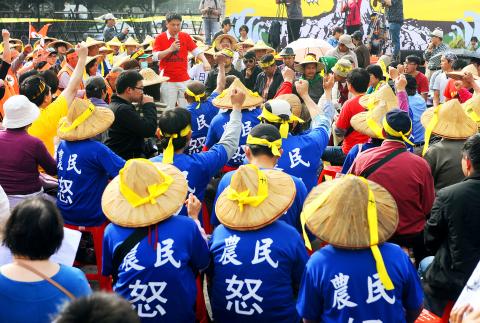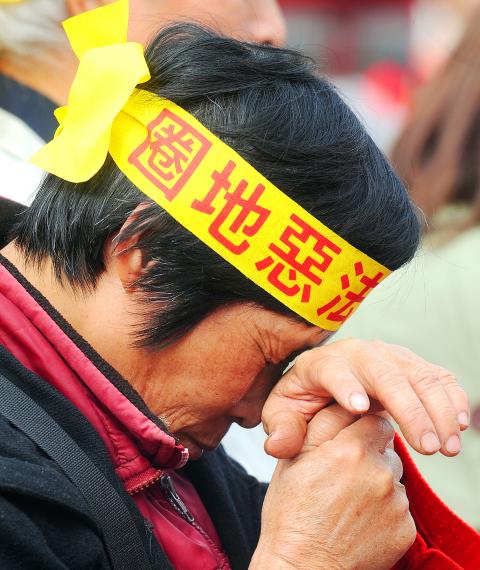Hundreds of people, including farmers and farming activists from Taiwan, Thailand, Indonesia, South Korea, Japan and Malaysia, yesterday rallied against the globalization of agriculture on Ketagalan Boulevard in front of the Presidential Office, protesting against the government’s plans to lift more bans on agricultral imports.
“We gather here today to express our anger, we want to tell the government that we’re fed up with their compromises on our food sovereignty, it’s a serious problem that our food self-sufficiency has dropped to 33 percent now,” Taiwan Rural Front (TRF) spokeswoman Tsai Pei-hui (蔡培慧) told the crowd at the rally. “You’ve put our dining tables and refrigerators in other people’s homes, we want to keep them in our own places.”
In addition to a series of heated protests against land expropriations that have been going on for years, farmers and farming activists are worried that the government may soon lift the bans on imports of 830 categories of farm products from China, as well as pork products from the US, despite President Ma Ying-jeou’s (馬英九) repeated promises that he would not do so.

Photo: Liao Chen-huei, Taipei Times
“During the presidential campaign, Ma promised numerous times that he would not lift the bans on imports of 830 categories of farm products from China, but now, Council of Agriculture Minister Chen Bao-ji (陳保基) is saying that the bans ‘may’ be lifted,” said National Cheng Chi University land economics professor Hsu Shih-jung (徐世榮), a long-time advocate of farmers’ rights. “When the government decided to lift the ban on imports of certain US beef products amid strong opposition from the public, Ma also firmly promised that the imports of US pork products would remain banned — yet the US government is now pressuring the Ma administration to lift the ban.”
Hsu said farmers across the country now “have little confidence in this incapable government” and therefore gathered to voice their opposition to free trade in the agricultural sector and to call on the government to insist on agricultural sovereignty.
Henry Saragih, the general coordinator of the Jakarta, Indonesia, office of international small farmers’ organization La Via Campesina, said that the problems that Taiwanese farmers encounter are the same for farmers across the world.

Photo: Liao Chen-huei, Taipei Times
La Via Campesina is an international coalition of peasants’ movements with 148 member groups in 69 countries around the world.
“Land grabbing, loss of food sovereignty and an increasing number of people threatened by famine — now reaching more than 1 billion — are problems created by the WTO, globalization and neo-liberalism,” Saragih said.
He said that Thailand, for instance, which originally had a diverse agricultural sector, now specializes in producing rice for export, and has to import other produce.
South Korea has become an exporter of electronic products, “and since most of its farmland has been taken by the industrial sector, some South Korean agricultural companies now grab land in Africa — especially Madagascar — to grow produce to be imported back to South Korea, leaving Madagascan farmers landless,” Saragih said.
Wirat Phromson, a member of the Northern Peasants’ Federation Thailand, urged farmers in Taiwan to continue their struggle.
Citing the farming rights movement in Thailand, Phromson said that despite the seeming flexibility of the Thai government and its promise to revise laws, “the [Thai] government eventually amended laws concerning the agricultural sector, but not for the interests of the peasants. Rather, it was for the interests of big corporations.”
“We want to tell our brothers and sisters in Taiwan and in Via Campesina: Do not believe those empty promises of the government,” he said. “We can’t let people from outside take valuable resources from us and impose on us the sufferings of hunger.”
Following performances by musicians in the evening, the rally ended with protesters throwing bundles of straw toward the Presidential Office.

Conflict with Taiwan could leave China with “massive economic disruption, catastrophic military losses, significant social unrest, and devastating sanctions,” a US think tank said in a report released on Monday. The German Marshall Fund released a report titled If China Attacks Taiwan: The Consequences for China of “Minor Conflict” and “Major War” Scenarios. The report details the “massive” economic, military, social and international costs to China in the event of a minor conflict or major war with Taiwan, estimating that the Chinese People’s Liberation Army (PLA) could sustain losses of more than half of its active-duty ground forces, including 100,000 troops. Understanding Chinese

The Ministry of Foreign Affairs (MOFA) yesterday said it is closely monitoring developments in Venezuela, and would continue to cooperate with democratic allies and work together for regional and global security, stability, and prosperity. The remarks came after the US on Saturday launched a series of airstrikes in Venezuela and kidnapped Venezuelan President Nicolas Maduro, who was later flown to New York along with his wife. The pair face US charges related to drug trafficking and alleged cooperation with gangs designated as terrorist organizations. Maduro has denied the allegations. The ministry said that it is closely monitoring the political and economic situation

UNRELENTING: China attempted cyberattacks on Taiwan’s critical infrastructure 2.63 million times per day last year, up from 1.23 million in 2023, the NSB said China’s cyberarmy has long engaged in cyberattacks against Taiwan’s critical infrastructure, employing diverse and evolving tactics, the National Security Bureau (NSB) said yesterday, adding that cyberattacks on critical energy infrastructure last year increased 10-fold compared with the previous year. The NSB yesterday released a report titled Analysis on China’s Cyber Threats to Taiwan’s Critical Infrastructure in 2025, outlining the number of cyberattacks, major tactics and hacker groups. Taiwan’s national intelligence community identified a large number of cybersecurity incidents last year, the bureau said in a statement. China’s cyberarmy last year launched an average of 2.63 million intrusion attempts per day targeting Taiwan’s critical

AGING: As of last month, people aged 65 or older accounted for 20.06 percent of the total population and the number of couples who got married fell by 18,685 from 2024 Taiwan has surpassed South Korea as the country least willing to have children, with an annual crude birthrate of 4.62 per 1,000 people, Ministry of the Interior data showed yesterday. The nation was previously ranked the second-lowest country in terms of total fertility rate, or the average number of children a woman has in her lifetime. However, South Korea’s fertility rate began to recover from 2023, with total fertility rate rising from 0.72 and estimated to reach 0.82 to 0.85 by last year, and the crude birthrate projected at 6.7 per 1,000 people. Japan’s crude birthrate was projected to fall below six,